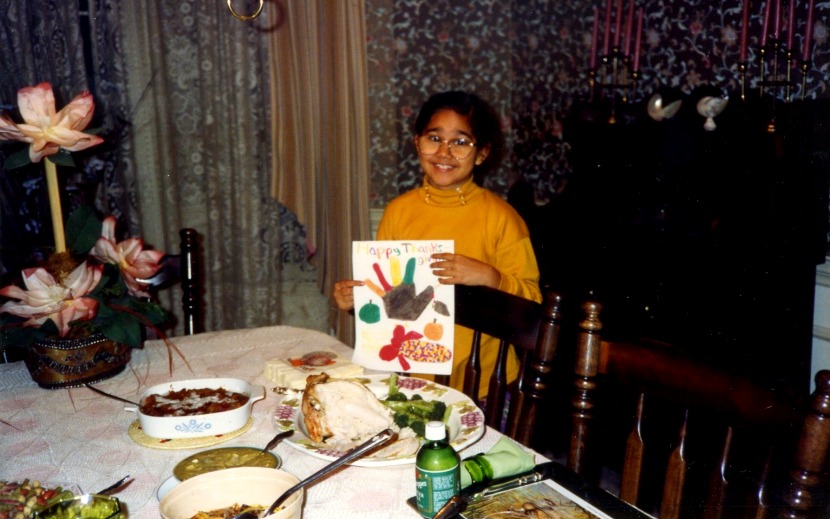Thanksgiving is our holiday. Truly, it is the holiday that belongs to all of us, no matter our ethnicity, religion, or cultural heritage. While many Mash-Ups across the country will celebrate with fusion flavors and old-country traditions (respect!), some of us give thanks in the most traditionally American way possible: with turkey, with sweet potatoes, with stuffing, and with family. Our Indian-American Mash-Up Nishta Mehra tells us why she may have eaten fresh dosas on Easter, but her extended Indian immigrant family always ate like white people on Thanksgiving. The taste of gratitude, it turns out, is something like Cranberry Fluff.
I was born on November 24, 1982 — the day before Thanksgiving — and my mom fondly relishes the memory of the hospital holiday dinner that she wolfed down after 20-plus hours of labor to bring her only child into the world. I was a turkey baby, a butterball in my own right, weighing in at 8 lb., 9 oz. My parents, who had fought infertility for many years, always felt it apropos that my arrival coincided with a day devoted to gratitude.
Thanksgiving has always felt like mine: my boo, my favorite, the holiday I feel most possessive of, its traditions the ones I am the most committed to maintaining. Growing up, my family hosted Thanksgiving dinner for our group of extended family — like many first-generation kids, the people I refer to as “family” are not actually my blood relatives, but rather the close-knit community of fellow Indian immigrants that my parents built after settling in Memphis, Tenn.
We ate white people food. No masala turkey, no fusion dressing, no side of cilantro chutney. Just straight-up Thanksgiving.
We called (and still call) ourselves the Arkansas Group, named after weekend trips to Arkansas state parks, just across the Mississippi River from Memphis. These trips emerged in response to the fact that us kids — who nearly all went to private, Christian schools — were off for Easter each year, a holiday that none of our Hindu and Jain families celebrated. Naturally, our parents decided that this posed the perfect opportunity to take us on nature hikes and force us to listen to Hindi music. The aunties made fresh dosas each morning; the uncles taught us how to play blackjack at night. And so, a tradition was born.
Over time, other traditions were established: the Raos hosted a giant Superbowl party each year. The Mehtas hosted Diwali. The Karkeras hosted Christmas, during which we were all led in group carol-singing, which I always found deliciously weird. We, the Mehras, hosted Thanksgiving.
My mom, like all of the aunties, is an impeccable hostess and an incredible cook. Her version of Thanksgiving was always a true feast. And it was always totally traditional — in other words, we ate white people food. No masala turkey, no fusion dressing, no side of cilantro chutney. Just straight-up Thanksgiving.

The kids in the Arkansas Group were lucky. Our parents did a seemingly effortless job of balancing us between the two poles of our hyphenated existence. All of us kids were exposed to the food, language, culture, and religious traditions of our parents. Now, as adults, it’s still important to all of us to practice those.
At the same time, none of us were ever made to be afraid of becoming “too American” — the distinction was never used as an adjective-weapon, the way it is in some families. We wore our hyphens proudly, if awkwardly at times. Now that I am a parent myself, of a mash-up kid, I marvel at how our parents pulled that off.
Thanksgiving was our holiday. Maybe it was because Thanksgiving felt distinctly “American” to our parents, and they wanted us to have that distinct experience, to eat the same things our white friends were eating with their families; or perhaps it was simply that they saw no reason not to embrace the traditions of their new homeland, but my parents took a “when in Rome” approach to Thanksgiving.
My parents saw no reason not to embrace the traditions of their new homeland.
Year after year, the menu stayed the same: breadcrumb-topped stuffed mushrooms, cheesy hash brown casserole, my mom’s famous marinated vegetable salad, traditional Southern cornbread dressing, overly sweet sweet potatoes with marshmallows on top, and a big ole turkey, the cooking of which was outsourced to Shaila Aunty. (My mom is a vegetarian — Shaila Aunty isn’t.)
To accompany the meal, my mom always made hot punch, a mysterious concoction of pineapple and cranberry and other juices, their flavors enhanced by the Red Hots she would pack into the percolator. A bottle of Jamaican rum stood guard next to the glass mugs my mom would have me rinse and dry, ready to spike the adult portions.
To end the meal, we’d have a strange but undeniably delicious concoction known as Cranberry Fluff: fresh cranberries pulsed in the food processor, stirred together with canned, crushed pineapple, chopped pecans, shredded coconut, Cool Whip, sugar, and mini-marshmallows. Super Southern, very church lady. We didn’t go to church, obviously, but there it was. Cranberry Fluff.
There is no pie in the Thanksgiving of my childhood, though it shows up clearly in pictures; the only pies I ever saw gracing our kitchen counter were store-bought (meaning they must have been brought by guests). The first pie I ever ate and enjoyed was made by my mother-in-law, a white woman from the Deep South.
My partner Jill’s family hails from northern Louisiana. They are salt-of-the-earth, blue collar, grow it, hunt it, cook it, eat it kinds of people. They are definitely not Indian. From them, I have learned the joys of giblet gravy, which Jill makes every year, and of pie, which I learned how to make from the dozens of recipes I copied from my mother-in-law’s handwritten recipe cards.
This Thanksgiving will be the first year that my entire mash-up family — me; my partner, Jill; our two-and-a-half-year-old son, Shiv; my mother; and Jill’s parents — all live in the same zip code. I’ve asked my mom to make her signature dishes, including hot punch, and Jill will bake a couple of pans of cornbread in her grandmother’s cast-iron skillet, leaving them out the night before Thanksgiving to dry for stuffing. Jill’s dad will supervise the frying of the turkey, and my son will loudly proclaim “AMEN!” at the end of our pre-meal prayer, as he has learned enthusiastically to do. It will still be super traditional, and it will be ours.
A whole lot of food, a whole lot of gratitude, and my big, weird family. God Bless America.

